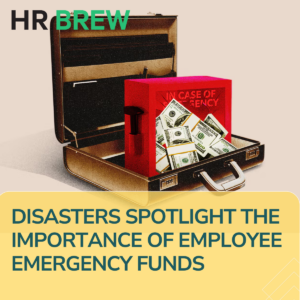By Gigi Hyland, Executive Director, National Credit Union Foundation
This article was originally published on the National Credit Union Foundation’s blog.

In 2017, I had the privilege to work with Aliza Gutman who was a Director at CFSI (now the Financial Health Network). Aliza collaborated with the Foundation to do financial health check-ups with six credit unions that formed the basis of our understanding around financial fragility for credit union employees and members.
That work echoed the staggering statistics that shed light on the everyday experiences of working Americans: Almost half of Americans can’t come up with $400 for an unexpected expense without borrowing or selling something, and nearly a third of households experience at least one shock annually that causes sustained material hardship.[1],[2]
The 2017 study funded by the Foundation found that more than half of credit union members and employees (across the six, diverse participating institutions) are not financially healthy.[3] In the event of an unexpected drop in income, 45% of members could only make ends meet for 3 months or less; another 10% don’t know.
Small-dollar financial shocks can derail financially fragile families: Payday loans can create overwhelming cycles of debt, one missed utility bill can cut off basic necessities, and a missed rent payment could lead to eviction.
Aliza has shifted roles and now works with an organization called Canary which is focused on creating a new type of financial hardship fund designed for the modern workforce. Financial hardship funds are not new in the credit union space. Several credit unions and system partners have financial hardship funds set up for employees. And, with COVID-19 affecting spouses, partners and significant others, credit union employees are trying to navigate what can be a significant financial burden associated with the pandemic. In fact, COVID-19 has only further highlighted how quickly and unexpectedly a period of financial instability can arise. In a time when millions of workers have lost income, many of us are needing help. But also, many – including employers – are asking how they can help those who need it.
Canary’s approach
Canary’s Grant Circle is an interesting approach that can help employers find a path to help employees in times of need while also providing a way for employees to support one another.
Canary leveraged behavioral design, digital technology, and its team’s deep understanding of employee needs to create an employee hardship fund platform that focuses on driving impact for both employees and employers.
Workplace-based Grant Circles are funded by employers and employees, creating a communal pool of funds, a quintessential example of people helping people. The fund formalizes what often occurs during times of financial stress: relying on friends, family, and colleagues for support.
The Grant Circle helps address a common gap in the portfolio of employee financial health offerings. Short-term, matched, and/or emergency savings programs are important to help workers proactively build a flexible safety net. Retirement savings programs are critical for long-term security. Low-interest loans and/or pay advance products provide employees with access to liquidity.
Cash grants during times of financial hardship can supplement these other solutions, filling in the gaps when a hardship has already occurred and a valued colleague needs help rebounding. Grants lower financial stress, can prevent small hardships from ballooning into major financial crises, and provide a safety net for workers without access to other options. What does the data say about hardship funds?
While employee hardships funds are increasingly common among large employers, they are not yet as widespread as we would like – or expect them to become – among mid-size and small employers. The available data underscore the tremendous impact that grants can have for workers experiencing financial hardship.
The Aspen Institute Financial Security Program and Commonwealth joined Canary’s Founder and CEO, Rachel Schneider, in a 2019 study of employee hardship funds. The research highlighted:
- Workers feel grateful and relieved.
- Workers feel more connected to their employers and their coworkers.
- Workers are better able to build and maintain financial health.
- Workers report positive impacts on job performance.
The paper concludes that employee hardship funds “can boost loyalty and cohesion within the company and provide a formal mechanism to support workers in moments of need. They can also deliver financial health gains by helping recipients to smooth over a rough patch and enabling them to come to work, and to come to work with less worry.”[4]
Canary’s impact tracking finds that the vast majority of Grant Circle grantees feel supported by their employer and report that the grant gave them the breathing room to figure out how to move forward. Moreover, more than three-quarters of grantees report that the grant helped them avoid at least one negative event, such as a late fee, utility shut off, or eviction notice.
In survey responses, qualitative interviewing, and responses to grant decisioning communications, the Canary team regularly hears employees express their relief, reduced stress, and gratitude, as in the following grantee quotes:
“I have never worked in a place where an employer has cared about my well-being, and I was touched when they offered the Grant Circle as a way to support us.”
“I cried of relief when my grant was approved. My husband cried, too; we were so relieved that we would not be on the street and that we would be able to get food for our kids.”
Canary is also tracking change over time in financial stress, overall financial situation, and key financial health indicators for approved and declined grant applicants. Analysis is underway to dig deeply into the data collected from two pilot programs, and the team looks forward to sharing more about what the impact data indicates, particularly when controlling for a variety of demographic and other characteristics.
Collective impact to improve financial well-being
This journey that the Foundation is on with credit unions – to improve people’s financial well-being by leveraging the credit union model – is longitudinal and requires creativity at all levels. Yet, our vision is simple – help members and employees achieve financial freedom.
Credit unions need to leverage a variety of tools and resources to enable employees to focus on work, to accomplish the credit union’s strategic objectives. That’s much harder to do when employees are stressed about their finances and spending time at work trying to address financial issues.
It behooves credit unions to look at a variety of different solutions, including hardship funds, to support employees’ financial health and well-being. If you want to learn more about starting an employee hardship fund at your organization, reach out today.
If you’d like to learn more about the overall impact of employee relief funds at organizations of any size or mission, download Canary’s Impact Report.
[1] “Report on the Economic Well-Being of U.S. Households in 2017,” Board of Governors of the Federal Reserve, 2018.[2] “The Role of Emergency Savings in Family Financial Security: How Do Families Cope with Financial Shocks,” The Pew Charitable Trusts, 2015. [3] “The National Credit Union Foundation: Financial Health Check-Up Aggregation,“ Center for Financial Services Innovation, 2017. [4] “Safety Net: Lessons from Research into Employee Hardship Funds,” The Aspen Institute Financial Security Program and Commonwealth, 2019.






